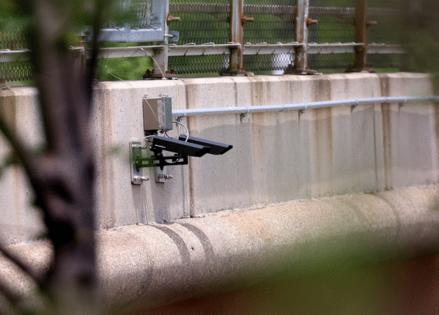Illinois secretary of state's office says law enforcement using license plate reader data illegally
Published in News & Features
The Illinois secretary of state’s office said Thursday it will conduct an audit of the state’s automated license plate reader system after it was allegedly used illegally by law enforcement in Texas to track down a woman for an abortion care-related matter.
A state law last year restricted the sale, sharing and access of its license plate reader data by law enforcement when it interferes with someone’s abortion rights, particularly if the person comes to Illinois from out of state.
While license plate readers can be used by law enforcement to investigate violent felonies and missing person cases, the state law also prohibits use of the data for matters including to aid in the detention or investigation of a person based on their immigration status.
According to the secretary of state’s office, Texas law enforcement authorities in May performed a nationwide search of more than 83,000 license plate reader cameras — which can be found on squad cars, street lights and along highways — to find a woman they said had a self-administered abortion. Almost all abortions are illegal in Texas while Illinois has numerous protections for women seeking to undergo the procedure.
The Texas authorities managed “to find a way to circumvent the law and collect Illinois license plate data illegally,” Secretary of State Alexi Giannoulias said during a news conference Thursday.
“This demonstrates a broader, problematic trend of other states leveraging this emerging technology, extending their reach beyond their jurisdictions to surveil and hunt down law-abiding individuals,” Giannoulias said.
While abortion is clearly a partisan issue, Giannoulias denied politics were at play in his decision to call for an audit.
“This is about protecting personal data,” the Chicago Democrat said. “This is not about Democrat versus Republican. This is about protecting this information, and it’s about abiding by Illinois law.”
The search from Texas authorities included cameras in Mount Prospect, the secretary of state’s office said. The northwest suburb’s Police Department’s license plate reader settings “provided a gateway into Illinois’ system operated by (Flock Safety, the service that operates the license plate reader network in question) for an unauthorized use, despite the Texas police stating that the reason for the search was related to abortion care.”
In addition, between Jan. 14 and April 30, there were 262 searches for immigration-related matters in Mount Prospect alone, the secretary of state’s office said.
Neither officials from the Mount Prospect Police Department nor the Johnson County, Texas, sheriff’s office, which investigated the case involving the woman, were immediately available for comment Thursday.
The secretary of state’s office said it instructed Flock Safety to immediately shut off access for out-of-state authorities to use the system illegally. As of Wednesday, Giannoulias said, the service had “identified 46 individual out-of-state agencies” who violated the law, and their access has been shut off.
Giannoulias’ office said in a statement it has also contacted the Illinois attorney general’s office to investigate the matter “and is establishing an audit system with additional safeguards to ensure any law enforcement entity using (a license plate reader system) in Illinois is adhering to the law.”
According to Sarah Garza Resnick, CEO of Personal PAC, an abortion rights group, law enforcement charged at least 210 pregnant people for “conduct related to pregnancy, pregnancy loss or birth” in the first year after the U.S. Supreme Court in 2022 overturned the constitutional right to an abortion, leaving regulations of the procedure up to individual states. On Thursday, Resnick said 114 of these cases “involved family-policing,” such as the woman in the Texas case. There’s no indication the woman ended up seeking abortion care in Illinois.
“If this woman didn’t want her family involved in her health care decision, she has every right to (keep) her privacy,” Resnick said. “And despite what anti-abortion politicians want, she has every right to travel freely and across our country.”
Under the law, police agencies could jeopardize their access to Illinois license plate reader data if they use it to prosecute or enforce another state’s laws pertaining to abortion care or for inquires about someone’s immigration status. Violating the law could also jeopardize the agencies’ well as their eligibility for federal and state grants.
©2025 Chicago Tribune. Visit chicagotribune.com. Distributed by Tribune Content Agency, LLC.







Comments